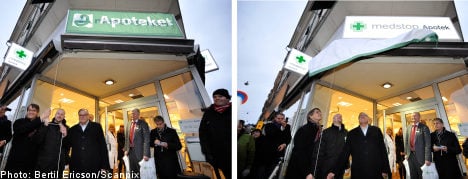“After hard work for a long time, we are now ready to open the first pharmacy in Sweden which is privately owned since 1971,” Hägglund said as reporters and a small crowd looked on.
The state-owned Apoteket chain of pharmacies was until Sunday the sole provider of prescription medication in Sweden, and was until November 2009 also the only provider of non-prescription drugs such as headache tablets or other over-the-counter products.
Sweden’s parliament in May 2008 voted in favour of the centre-right government’s plans to open up the country’s market for prescription and non-prescription drugs to competition.
In November 2009, the Swedish state sold 465 of its estimated 900 state-owned Apoteket stores to four firms, all of them Swedish companies established for the sole purpose of running the pharmacies.
The pharmacy inaugurated on Sunday, in the Kungsholmen district of Stockholm, was the first of such pharmacies to operate under its own brand name. It is operated by Medstop, which has also taken over a further 61 pharmacies across Sweden.
“We want to increase accessibility and think that can be achieved through competition” in the pharmacy market, Hägglund said Sunday of the new pharmacy system.
As of November 1st, 2009, Swedes wanting to buy non-prescription drugs could do so at selected stores, including some gas stations and grocery shops.
The Swedish government has previously argued that putting an end to the Apoteket monopoly would improve the availability of medicines for customers in the form of more pharmacies and longer opening hours, and create downward pressure on prices as more providers entered the market.



 Please whitelist us to continue reading.
Please whitelist us to continue reading.
Member comments